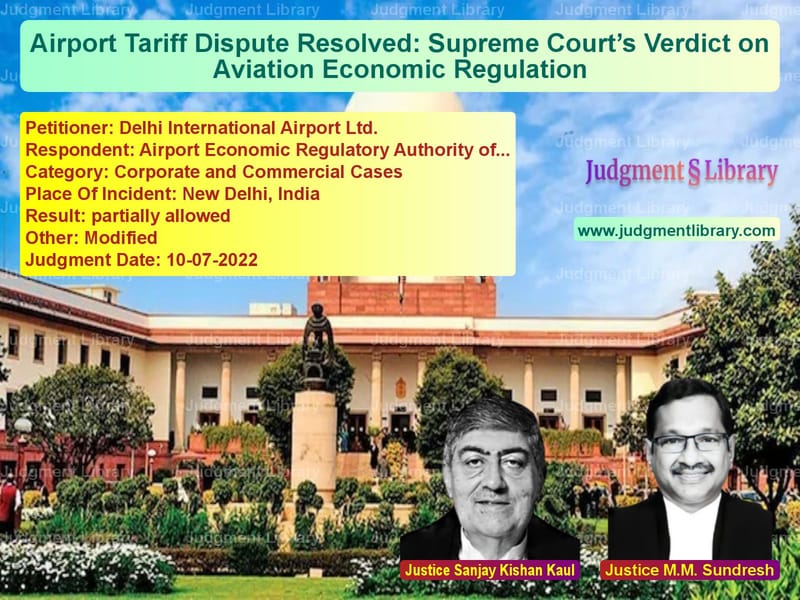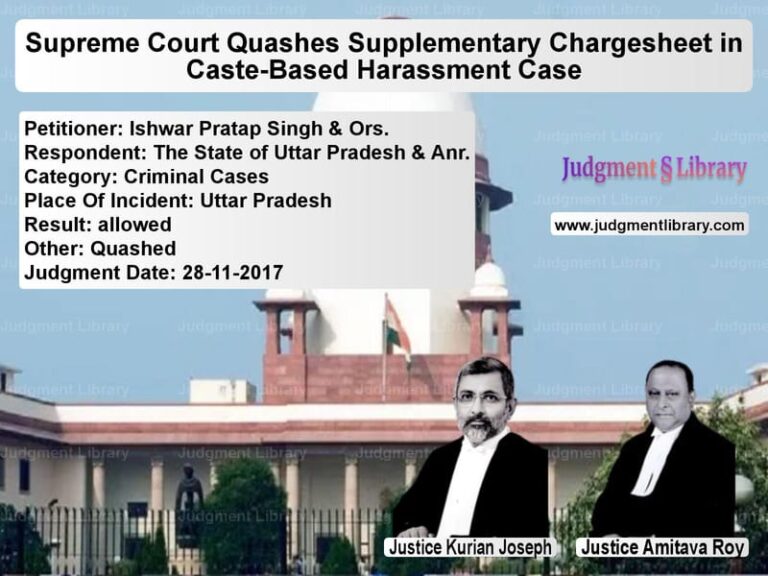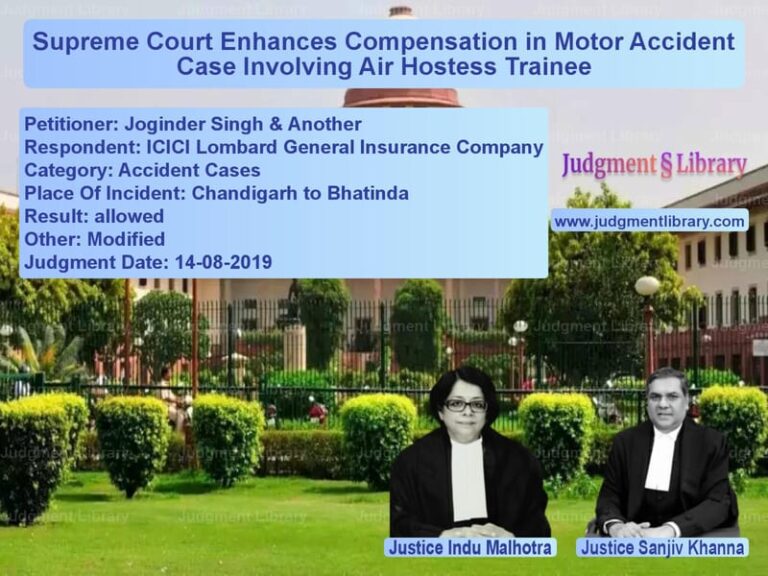Airport Tariff Dispute Resolved: Supreme Court’s Verdict on Aviation Economic Regulation
The Supreme Court of India, in the case of Delhi International Airport Ltd. v. Airport Economic Regulatory Authority of India & Ors., addressed key issues regarding the regulation of airport tariffs, aeronautical charges, and economic rights of private airport operators. The judgment provides significant insights into the financial framework governing the aviation sector, particularly in relation to revenue sharing models, development fees, and regulatory authority oversight.
This case revolved around multiple appeals by Delhi International Airport Ltd. (DIAL) and Mumbai International Airport Ltd. (MIAL) against the tariff determination and regulatory policies imposed by the Airport Economic Regulatory Authority of India (AERA). The decision impacts major stakeholders, including airport operators, airlines, and passengers.
Background of the Case
The dispute originated from India’s policy shift in the 1990s, allowing private investment in airport development. Public-Private Partnerships (PPP) were introduced, leading to private companies like DIAL and MIAL taking over operations of Indira Gandhi International Airport (IGIA) and Chhatrapati Shivaji Maharaj International Airport (CSIA) respectively. These agreements required the private operators to share a portion of their revenue with the Airports Authority of India (AAI).
In 2009, the Airports Economic Regulatory Authority of India Act (AERA Act) was enacted, empowering AERA to regulate tariffs for aeronautical services. Disputes arose when AERA issued tariff orders affecting the revenue model of the private airport operators. The matter reached the Supreme Court after prolonged legal battles at the regulatory and appellate levels.
Petitioner’s Arguments
DIAL and MIAL challenged AERA’s tariff determination on several grounds:
- Revenue Sharing and Tariff Calculation: The airport operators argued that AERA’s methodology for calculating revenue, including the treatment of Fuel Throughput Charges (FTC) and the Hybrid Till Model, unfairly reduced their financial returns.
- Regulatory Authority Overreach: They contended that AERA’s authority was limited to aeronautical services and that it had no jurisdiction over certain non-aeronautical revenue streams.
- Impact on Private Investment: The operators claimed that AERA’s tariff determination discouraged private investment in airport infrastructure, violating the principles of economic liberalization.
- Development Fees and Hypothetical Regulatory Asset Base (HRAB): They objected to AERA’s calculations of development fees and asset valuation, asserting that it led to under-compensation.
Respondent’s Arguments
The Airport Economic Regulatory Authority (AERA) defended its tariff orders, stating:
- Regulatory Framework Compliance: AERA asserted that its tariff determination adhered strictly to the provisions of the AERA Act and the agreements signed between airport operators and the government.
- Consumer Protection: It emphasized that tariff regulation was necessary to prevent monopoly pricing by private airport operators, ensuring fair charges for airlines and passengers.
- Public Interest: AERA maintained that cross-subsidization from non-aeronautical revenue was crucial to keeping aeronautical tariffs reasonable.
- Legislative Mandate: The authority argued that the legislative framework mandated it to regulate all revenues affecting aeronautical charges, including fuel charges, development fees, and revenue share components.
Supreme Court’s Observations
The Supreme Court analyzed the contractual and regulatory framework in detail and made the following key observations:
- Legislative Intent: The court ruled that tariff determination must align with the agreements between private operators and the government while ensuring regulatory oversight.
- Fuel Throughput Charges (FTC): It upheld AERA’s decision to categorize FTC as an aeronautical charge, stating that airport operators could not treat it as a non-aeronautical revenue source.
- Tariff Determination Methodology: The court rejected DIAL and MIAL’s proposed revisions to the tariff formula, affirming that AERA’s methodology was legally sound.
- Revenue Share Model: The court emphasized that revenue-sharing agreements with AAI must be honored and that airport operators were bound by their financial obligations.
Final Judgment
The Supreme Court delivered a mixed verdict, ruling:
- The appeals challenging AERA’s tariff orders were largely dismissed, upholding the authority’s regulatory framework.
- The court affirmed the classification of Fuel Throughput Charges (FTC) as aeronautical revenue.
- The court ruled that the calculation of the ‘T’ element in the target revenue formula should exclude the deduction of the annual fee paid by the operators to AAI, partially favoring the petitioners on this aspect.
- The court upheld the principles of economic regulation in airport management, reaffirming AERA’s role in balancing investor interests with consumer protection.
This landmark ruling reinforces the legal framework governing India’s aviation sector, ensuring fair regulatory practices while maintaining investor confidence in airport privatization.
Petitioner Name: Delhi International Airport Ltd..Respondent Name: Airport Economic Regulatory Authority of India & Ors..Judgment By: Justice Sanjay Kishan Kaul, Justice M.M. Sundresh.Place Of Incident: New Delhi, India.Judgment Date: 10-07-2022.
Don’t miss out on the full details! Download the complete judgment in PDF format below and gain valuable insights instantly!
Download Judgment: delhi-international-vs-airport-economic-reg-supreme-court-of-india-judgment-dated-10-07-2022.pdf
Directly Download Judgment: Directly download this Judgment
See all petitions in Corporate Compliance
See all petitions in unfair trade practices
See all petitions in Mergers and Acquisitions
See all petitions in Judgment by Sanjay Kishan Kaul
See all petitions in Judgment by M.M. Sundresh
See all petitions in partially allowed
See all petitions in Modified
See all petitions in supreme court of India judgments July 2022
See all petitions in 2022 judgments
See all posts in Corporate and Commercial Cases Category
See all allowed petitions in Corporate and Commercial Cases Category
See all Dismissed petitions in Corporate and Commercial Cases Category
See all partially allowed petitions in Corporate and Commercial Cases Category







